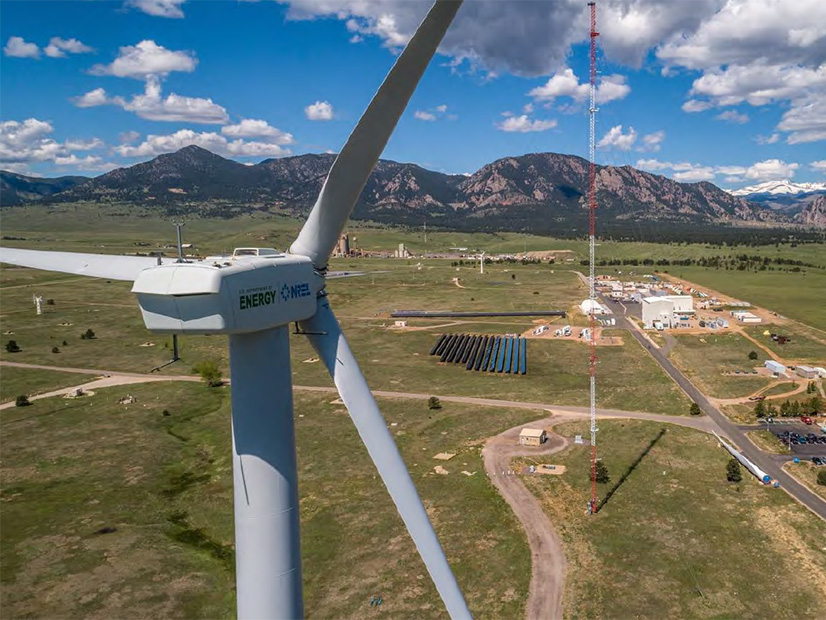
Four Western states — Colorado, Wyoming, Utah and New Mexico — are teaming up to compete for a share of $8 billion in federal funds that will be awarded for the development of regional clean hydrogen hubs.
Under an agreement announced Thursday, the four states will work together to develop a Western Inter-States Hydrogen Hub that will include facilities in each state.
The states will jointly submit a hydrogen hub proposal when the Department of Energy opens the application period, which is expected in May. The states will also respond to DOE’s request for information issued this month.
Each state will appoint up to three members of a workgroup to coordinate the efforts.
“These states are uniquely situated to become a clean hydrogen hub given the presence of high-quality wind, solar, biomass, natural gas and other energy resources,” a release from New Mexico Gov. Michelle Lujan Grisham’s office said.
The agreement signatories include two Democrats — Lujan Grisham and Colorado Gov. Jared Polis — and two Republicans, Utah Gov. Spencer Cox and Wyoming Gov. Mark Gordon.
As part of the agreement, each state promised to not participate in any other hydrogen hub proposal. But the agreement encourages the individual states “to enter into separate agreements with other entities that further hydrogen development in their states.”
If all four states agree, other states may join the partnership.
Competition Developing
The federal Infrastructure Investment and Jobs Act, which President Joe Biden signed in November, allocates $8 billion in funding for four or more regional hydrogen hubs. The infrastructure law also includes $1 billion for a clean hydrogen electrolysis program to reduce costs of hydrogen produced from clean electricity and $500 million for clean hydrogen manufacturing and recycling initiatives.
Competition for the money could be heating up.
In addition to Thursday’s announcement from the four Western states, a bill moving through the Washington legislature would authorize the use of state funding to boost that state’s bid for federal hydrogen hub money. (See Fast-moving Bill Seeks to Win Hydrogen Hub for Wash.)
Proponents say Washington’s abundant water supply and extensive hydroelectric network make it a good hydrogen hub candidate.
The agreement among the four Mountain states argues that the region is ideally suited to serve as a hydrogen hub. Reasons include the area’s sophisticated oil and natural gas industry, a robust energy transportation infrastructure, established carbon management infrastructure and favorable geology.
In a statement, Colorado Gov. Polis pointed to “intellectual capital” in his state, which includes universities and the National Renewable Energy Laboratory.
Utah is home to the Intermountain Power Plant, a coal-fired facility that the Los Angeles Department of Water and Power plans to convert to a combined cycle natural gas-fired facility. The plant will initially be able to burn a fuel mixture containing 30% hydrogen, eventually operating on 100% hydrogen, according to the Green Hydrogen Coalition.
How IPP might fit into the four states’ plans for a hydrogen hub remains to be seen. The plant provides power to Los Angeles, which is viewed as a center of green hydrogen development.
Arizona Activity
Another possible contender is Arizona. In October, DOE announced $20 million for a demonstration project that will produce green hydrogen using power from the Palo Verde nuclear plant about 55 miles west of Phoenix. (See Palo Verde Hydrogen Demo Gets $20M from DOE.)
“Arizona is on the cusp of becoming the epicenter of clean hydrogen production,” Arizona Corporation Commission member Lea Marquez Peterson said in a statement at the time.
Marquez Peterson said that the ACC had approved a special rate agreement between Arizona Public Service Co. and fuel cell and battery-electric truck manufacturer Nikola Corp., which is based in Arizona.
In its 2021 annual report, filed on Thursday, Nikola noted that hydrogen coalitions and stakeholder groups are increasing their involvement in state and national initiatives, including support for the hydrogen agenda in the Infrastructure Investment and Jobs Act.
In addition, “new stakeholder groups and initiatives [are] forming in preparation for national investment from the U.S. Department of Energy in Regional Clean Hydrogen Hubs across the country,” the company said.
